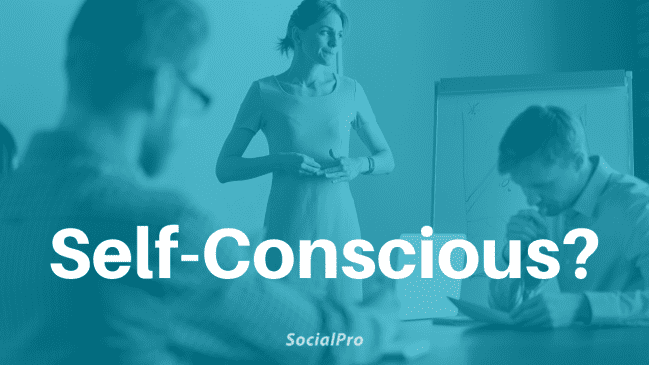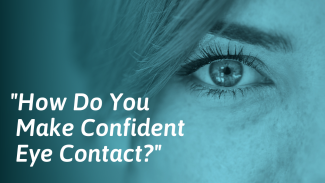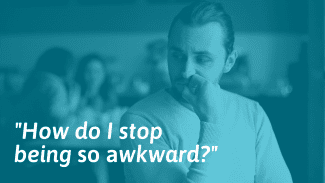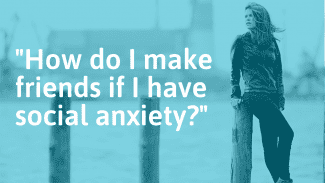When I was younger, I often felt self-conscious and socially awkward. In fact, one of the reasons I wanted to become a Behavioral Scientist was to be better socially.
If you often feel anxious and embarrassed, this guide is for you. It will give you the tools you need to be more relaxed in social settings, get out of your head and into the conversation.
This guide is for anyone who’s feeling overly self-aware, but examples are geared toward adults in work or at college.
Note: Sometimes, the underlying reason for self-consciousness is social anxiety. If this is the case for you, here’s our list of the best books on social anxiety.
Let’s get started!
1. Focus on someone or something
Self-consciousness comes from being overly concerned with how people see us. We worry that we won’t be seen as smart, attractive, or that others are judging us.
It can be exhausting, and with too little evidence to support the argument in either direction, we go straight to the most negative conclusion.
To get out of this pessimistic mindset, try shifting your attention to the people around you and your environment.
Focus not on what others think of you but on learning about the people you’re with. Make it a point to find out one thing about every person you meet. It could be their job, their major, or what they did on the weekend.
The objective is to get out of your head. Put that energy into the people around you rather than into feeding an inner dialogue that’s holding you back.
2. Question your inner critical voice
It’s easy to believe the negative voice inside our head is always right. But have you tried questioning it? You might find out that it has little to do with what’s real.
Check the evidence from your life:
Can you recall a time you did something that proves your inner critic wrong? For example, if your voice says, “I always mess up around people,” remind yourself of a time when you did just fine.
Ask yourself if what you are feeling is reasonable. Or, are you letting a perception you think others have of you, run the story in your head?
3. Know that people notice you less than you think
In an experiment, students were asked to wear an embarrassing t-shirt.
By the end of the day, the students who wore the shirts estimated that 46% of the class had noticed. When polled, only 23% of their mates actually had.[1] In other words, their embarrassing t-shirt was only half as noticeable as they had thought.
What feels mortifying to us is usually having little to no impact on others. People are caught up in their own thoughts and struggles, too busy to worry about ours. The best thing we can do is remind ourselves that no one cares as much as we do, and even our own filter is not a perfect lens.
4. Know that it’s OK to say some stupid things
I remember talking to a girl I was crushing on when I was in high school. She was talking about how her brother liked a band, and like a crazy person, I said, “Ya, I know.” Like somehow, I knew what group her brother liked. My crush looked at me strangely but kept going.
Did it make any difference to my crush? Not really. At this point, I can laugh about it, but at the time it felt humiliating.
Try turning the tables on the situation. Would you care if someone blurted out something silly? Or would it just pass you by without giving it extra thought? It’s better to talk freely even if you say something stupid every once in a while. The alternative is to always guard yourself, and that can make you come off as stiff and aloof.
5. Don’t try to fight your feelings
Emotions tend to cling harder when we fight them and weaken when we accept them.[2]
When you are anxious, and feeling uncomfortable in a social setting, what are you thinking about? How does thinking about that make you feel? Happy, sad, nervous, jealous? What’s your body doing when you’re in your head and feeling awkward at a party? Are you sweating, jumpy, yawning a lot (a reaction to nerves)?
Simply accept how you feel rather than trying to change it.
Now focus outward. Talk to someone. Ask them how they’re doing. What brings them to this party/event? Do they know anyone? Then check your head. How do you feel when you’re talking to someone? Do you get any less nervous as the conversation goes on? If you were blushing, has it subsided yet?
Practice going back and forth between your inner thoughts and how you feel when you are talking to others. See if you feel better when you’re in your head, listening to your internal dialogue, or when you’re spending your energy on others.
6. Focus on your positive traits
This isn’t “think happy thoughts, and you’ll be fine.” Instead, you want to base your self-worth on your real, positive qualities rather than cynical and questionable self-talk. This is what we know is true:
- You have talents and abilities that give you fundamental value.
- This combination of characteristics makes you unique and memorable.
- You are worth spending time with and knowing.
Try to list your concrete skills like your mathematical ability, you’re a good writer, you’re multilingual, you’re a great cook. Then there are your personality traits. You’re kind, honest, genuine, funny, enthusiastic, etc.
Even if you can’t make a full list today, write one positive quality down every day and then review the list every week. When you have a comprehensive list, read it every day. You’re training your mind to focus on what you do well and to be able to access it quickly.
7. Make sure you’re reading the situation right
Negative experiences can teach us to be on guard and defend ourselves from criticism and hurt. This can affect how we perceive the world and the people we encounter.
Those of us who are overly self-conscious might believe the world will judge us harshly because that is what we’ve experienced. However, as I’ve pointed out, people don’t care that much about how we act or what we say. Every new person you meet thinks of you as a blank slate.
When you’re in a scary social situation, ask yourself, “Is there a chance my past experience is affecting how I’m seeing this interaction? Is there another, more realistic way I can approach his conversation?”
Believe people will be friendly, and most of the time, they will be. If not, it says more about them than you.
8. See yourself as a social observer
People watching is fascinating, and it shows us how our basic humanity makes us all messy, foolish, and funny. Go to the mall, grab a coffee/tea, and watch people walk with their friends. Listen in as they sit beside you and talk, or as they chase their kids down the hall.
Now notice their body language, their tone of voice, and eavesdrop on what they’re saying. What we’re doing is training you to switch your focus from yourself to others and to think objectively about what you’re witnessing.
Are people relaxed or stilted? Is their posture good, or are they slouching? When they talk, are they quiet, or does the volume go up and down with excitement? The more we see others being their imperfect selves, the more we’ll realize this is what ‘normal’ looks like.
Go into this observer mode when you walk into a room of strangers. It can help you be less self-conscious.
9. Assume that people will like you
This one is about the mechanics of being seen as confident rather than inhibited or self-conscious. When we feel uncomfortable, it can make us talk softer, hug our bodies with our arms, and speak faster to get the words out and move the focus off us as soon as possible. It can make us seem aloof, and even if we don’t intend to, it makes us less approachable.
Be confident and friendly right off the bat. Walk up to people with a warm smile and present yourself. If you’re uncertain about the details, look at how likable, confident people do it and learn from them. Assuming people will like you is a self-fulfilling prophecy. Assuming they won’t is, too.
10. Ask about others to take the focus off you
It’s easier to focus on someone else other than ourselves. When you meet someone for the first time, ask them what they do for fun. What are their hobbies, or do they have any pets? Listen carefully, nod, and give them signs that you are enjoying their story. Then add anything relevant that applies from your life. Things like your pets – what kind are they, their name, breed…or your hobbies. At the end of the day, you want to have a balance between learning about them and sharing about yourself.
The goal is to learn about someone else because it’s hard to be self-conscious when you’re focused on getting to know another’s interests and stories.
11. Make internal progress checks, not comparisons
Jealousy is a miserable emotion. It makes you feel small and worthless and sucks the joy out of everything. It’s like anger directed at someone else, but you are the one who feels crappy.
Avoid both overexaggerating someone else’s talents or trying to find flaws in them to make yourself feel better. No one is perfect, and tearing them down when you feel envious just retains the focus on you because you are still comparing yourself to someone else.
Here’s a thought: What if we were OK with the fact that someone is more accomplished than us? When we accept this, it helps us see ourselves differently.
Our value then has nothing to do with how successful we are or how good we are at something. We want to go from “I like myself because I’m good at…” to “I like myself.” (Period.) This makes our self-acceptance unconditional.
How do we accept that others are more accomplished than us and be OK with that? First, let that fact sink in, and allow all your emotions of envy and sadness to come to you. Accept those emotions rather than fight them. Now, you no longer need to fear them. Afterward, you will be less prone to comparisons.
Here’s another way to do it:
Instead of thinking, “Well, at least I’m better than them when it comes to X.” Say, “I’m not good at everything, which is OK because my value isn’t based on my achievements. I have value because I am 100% myself”.
Let’s talk more about how to be more self-accepting…
12. Practice accepting yourself
Self-acceptance is one of the biggest steps we take towards achieving self-confidence.
According to Aaron Karmin, MA, LCPC, a psychotherapist in Chicago, Ill, a person “who accepts [themselves] unconditionally as a worthwhile human in spite of [their] faults and imperfections does not experience the stress of self-consciousness.”.[3]
Here are some things you can do to accept yourself:
- Decide how you are going to live your life. Will you let others define your personal image, your strengths, and your weaknesses? Try to move from blame, doubt, and shame to tolerance, acceptance, and trust.
- Make a list of all your good points.
- What do you do well?
- What are you proud of accomplishing?
- Whose lives have you made better?
- Connections you’ve made with others.
- Hardships you have overcome.
Review the list often, so you see your progress and acknowledge your gifts.
- Take an inventory of the people close to you.
- Are they good for you?
- Do they reinforce negative self-talk?
- Do they criticize or demean you?
Consider eliminating all the negative influences in your life.
- Surround yourself with a positive support group of people who celebrate you.
- Forgive yourself. If you made a mistake, realize you did your best with the information you had at the time, or you simply made a bad choice. But now you chose to move on and forgive yourself.
- Silence your inner critic. Just because it’s hard to hear doesn’t mean it’s right or 100% true. If you wouldn’t talk to someone else like you speak to yourself, why is it OK to do it to you? You’re human like everyone else. Treat yourself as well as you treat anyone else, if not better.
- Move on from your unrealized dreams. You can’t change the past. All you can do is move forward and continue to pursue your current goals.
- Help yourself see how you make others’ lives better. It’s harder to see yourself in a harsh light when you acknowledge all the good you do.
- Let it go – You can’t control everything. It’s not resignation. It’s a realization that your energy is better spent elsewhere instead of railing against the things you can’t change.
- Try to solve your problems one at a time. First, step outside your head where all the worry and self-doubt resides. Take a dispassionate look at what you need to do to move past each issue. You could even try imagining that the problems you’re facing are someone else’s (if that helps you get away from your internal thoughts). Ask yourself what advice you’d give them (yourself) to help?
- Practice Self-compassion – accept your flaws and love yourself anyway. Simple words, but for most of us, it takes years, if not a lifetime to master this step. The more you do it, the better you’ll get in every respect.
- Even though you may not have much experience being kind and compassionate with yourself, you will start to believe these good things you’re telling yourself. Especially if you keep this positive internal monologue up. In many instances, it took years to get to this place of insecurity. It will likely take weeks and months to see progress and make permanent changes to your mental habits.
13. Practice thinking about other’s needs
Try doing thoughtful things for others. Consider their struggles, worries, dreams or regrets. When you do, you take the focus off yourself and you’ll connect with them. This will help you be less self-conscious.[4] It will also show others that you are caring, and you value them. Done selflessly, it will bring good things back to you.
Here are some suggestions:
- Smiling at someone after you meet them. It could be a friend, family member, or acquaintance. Let the smile happen as you talk to them, so they know you are smiling just for them because it grows after you say, ‘Hi.’
- Hold a door for someone.
- Give a spontaneous compliment.
- Bring a friend or co-worker cookies or a pre-made dinner if they are sick or need a pick-me-up.
- Pay it forward. Pay for the coffee or drive-thru meal of the people behind you.
- Keep your area tidy and organized if you work in an open-concept office.
- Send cards for different occasions or for no occasion at all.
- Give someone 100% of your attention and note what they say so you can follow up later. (Ask them how ‘it’ went. Make sure they are OK afterward.)
- Consciously spend a few minutes every day thinking of the things you are grateful for.
A word of caution: Do not do these things to gain others’ approval. That puts the focus back on you. Do it out of sincere consideration for others. The purpose of the exercise is to focus on others and their well-being. When you do, you’ll become more compassionate and less self-conscious.
14. Consider talking to a Therapist
If your self-consciousness is inhibiting you or is a result of social anxiety, a therapist can be helpful. Having social anxiety is more common than we think, and deciding to understand and address the effect it has on your life is brave. A Psychologist or a Therapist will help you talk through your feelings, find out where they originate from, and give you the tools to unpack them and move forward.
We recommend BetterHelp for online therapy, since they offer unlimited messaging and a weekly session, and are cheaper than going to a therapist's office.
Their plans start at $64 per week. If you use this link, you get 20% off your first month at BetterHelp + a $50 coupon valid for any SocialSelf course: Click here to learn more about BetterHelp.
(To receive your $50 SocialSelf coupon, sign up with our link. Then, email BetterHelp’s order confirmation to us to receive your personal code. You can use this code for any of our courses.)
You can also try contacting your insurance company or doctor for recommendations.












I have 2 problems
First,
I am afraid to say anything to say in front of my friends or colleagues as I feel they might judge me for being stupid or boring.
Second,
I have a lot of people around me who I can call friend sortof. As they are joking around I don’t know what to say that is funny that everyone laugh at. Even if I try they don’t seem to make them laugh or add any funny/surprising thing in conversation. Hence people see me as a boring person.
I usually talk so much in person but become quite in group of more than 3 people.I seriously need help to overcome my problem.
Im scared to talk in front of many people like when im reporting in our school in front of my classmates, i stutter and even if i already memorized what will i say im always forgetting it so im getting a sore throat because of nervousness then i stutter and i feel like im gonna cry. My voice is low too when im nervous but when im with my friends or family i cant control my voice, its becoming loud. And most of the time im not talking without thinking what will i say so im a late replier, i cant talk long sentences without thinking(im a slow thinker :<<) . Im not good at speaking but im good at writing :<< .
you sound just like me when I was in high school. I was so scared about speaking in front of people, and I would choke up sometimes too. I am 61 now! And I do well speaking in front of others. The bit of advice that I got that really helped me was: speaking in front of others is not just a natural talent; it can be learned. It’s not that we were or weren’t born with the ability, it’s that we can learn to become good at it. You could try meeting with a speech therapist to work on; you could start watching some YouTube videos about it, or ask someone who is good at it to help you. you can learn it!
Hi! Thank you for advice :> Im already practicing my social skills bit by bit by myself. I always kept on my mind that I will fully learned it someday. I hope that I will be good at socializing soon.
I fear having conversations with people even those I know. It’s like my brain just shuts down in all social situations. I’m an incredible writer but trying to use words when confronted by people i will suddenly lose all thoughts. Its extremely depressing and causes me to be lonely.
Well except for some specific people,I get really scared and nervous to talk with people first, it’s like I can’t properly start a conversation and when the person I’m talking with is too much extrovert then I get easily nervous and extremely uncomfortable around them.
I am not comfortable with communicating people even though I talk with them daily at my office. I have knowledge and other good skills but I am not able to express that nicely. Now I am working on my communication skills and trying to improve it.
I fear interacting with people including close friends.
I fear that I’m an imposter trying to be someone I’m not.
Rarely I have an interaction that I enjoy so much I loose track of time. I rarely have these interactions because my mind will put obstacles in my way then I find myself not being able to focus on the conversation I’m having.
I fear I will never have anything interesting to talk about.
I fear wanting to talk personal with people, but it’s too deep and too exhausting for most.
I fear not being witty and all I can talk about is serious topics.
I feel so lost with all this. And now that I’ve become aware to how I feel, I’m exhausted.
Chantel, you describe exactly the way I feel as well. Including the part about not being witty enough and can only think of serious things to talk about, if I can think of anything to talk about at all. During one on one conversations my chest will get tight, I worry if I’m using too much eye contact, and I’m just so uncomfortable I just wanted to end it and get out of there. Also, I know that if I’m not feeling comfortable, I’m making the other person feel uncomfortable and they probably want to end the conversation too.
I am Mca Completed. You know I somehow well in learning Programs. But Have lack in Communication. Ofcourse, I speak well with my friends. But I afraid to speak with strangers or even my Teachers. I dont know how I got Selected in First Interview itself. I started to work in a job with lack of communication. First I felt comfortable that I shined well in Programming but can’t able to explain to my manager. I really felt bad after I realised that I afraid of Speaking from my School days to College.???? One day My Senior who selected me in an interview told that He chose me for well Programming skill. He advised me to improve my communication. I felt really bad and afraid. I quit my Job now. Now I’m trying to improve mY Communcation skill!!!
I afraid that people won’t understand me, or not like suggestions (eg: like this movie is good, you should watch it!)
I also feel insecure as being perceived as immature as I look younger than my peers.
That I’m stupid /or boring.
I don’t what to talk in first meeting with people. I have no discussion to do I’m so opposite from the people where I study ( because there is a lot of things that are common to them but I cannot do because my family don’t allow) so it is very difficult to adjust there. I don’t go out with them on any event or gathering as again my family doesn’t allow me to go so it’s difficult to make friends or to know what to talk with people. Also I get so insecure with people who are little close to me when ever I see they are having fun with other friends I became insecure that they will forget me or they will not like my company anymore because I’m boring and all.
I know how boring I am and I’m just too quiet bc I always overthink if what I’m about to say is right or not, I’m afraid they all think I’m annoying being like that, but they still pretend to be nice to me.
I am always afraid that I might sound dumb in front of others.
I am so self-critical. The minute I see something my mind starts comparison.. it’s so reflex that I hardly notice the process but that eventually makes me feel small and under confident 🙁
I feel like my thoughts are not worth much time so I cut myself short in conversations. I worry about being inarticulate and people thinking I am not so smart. I can’t seem to break into conversations at parties and dread going places where everybody knows each other but I know no one, I end up standing at the periphery hoping to be kindly included. Thank god for phones as I can look preoccupied with that while the world around me chats it up!
I get so anxious in social situations that I don’t even know what to say. Because of this I find it very difficult to hold conversations a lot of the time, and I’m afraid nobody likes me as a result
I get it, not even my “friends” seem to like me, so I tag along in silence.
I feel inadequate in social situations. For me, it feels like if I say something, nobody notices or acknowledges what i say, like I’m invisible or something especially in group conversations.
One’on-ones are slightly better in that regard but I always feel like I come across as an extremely boring person that no one would want to be friends with and that fuels my anxiety even more. And I dont know what to do about that
I fear that I am not good at having conversations, let alone keeping them. That I am quiet and boring with nothing interesting to talk about. Which then makes me think that people are judging me.
That’s exactly how I feel, too. Sometimes I think people might judge me for being boring.
I am boring
I feel the same way. Like people are secretly judging me in their minds for being boring
I feel like that too, like I’m not good enough…
For me its hard to talk others I’m started to being confused even I’m talking to my friend i have that situation whenever my best friend died i cant talk others I’m started to be alone there is no one else in my life and my life is colorless but when I’m join high I’m little settle I’m start talking others but still confused what to say is it hurt anyone is it right or not? I dont know why it is ..
Really sorry for your loss
Im afraid of sounding ignorant and like I don’t know what I am talking about.
I feel like it is hard for me to get into a conversation, and I often overthink and start second guessing myself asking “why did I say that” and I wonder what the people I was talking to are thinking of me now.
Yea same, my “friend” has only made it worse by saying; ohh Ella u have the awkward energy radiating off of u. Like who says that to somone who they know is even socially struggling.
I feel like it is hard for me to get into a conversation, and I often overthink and start second guessing myself asking “why did I say that” and I wonder what the people I was talking to are thinking of me now. I was the kid who got picked last and got made fun of so now it’s hard for me to trust. I feel insecure especially around the family I married into. I feel left out of their conversations at gatherings which are quite frequent and I feel inadequate and dumb when I try to chime in.
I feel like it is hard for me to get into a conversation, and I often overthink and start second guessing myself asking “why did I say that” and I wonder what the people I was talking to are thinking of me now. I was the kid who got picked last and got made fun of so now it’s hard for me to trust. I feel insecure about talking in groups and now especially around the family I married into. I feel left out of their conversations at gatherings which are quite frequent and I feel inadequate and dumb when I try to chime in.
I feel like it is hard for me to get into a conversation, and when I do try and speak up, I start second guessing myself asking why did I say that and what do they think of me now. I was the kid who got picked last and got made fun of so now it’s hard for me to trust. I feel insecure about talking in groups and now especially around the family I married into. I feel left out of their conversations at gatherings which are quite frequent and I feel inadequate and dumb when I try to chime in.
I am insecure about not being a good conversationalist, or mispronouncing a word. I am also afraid my body language will give off signs that I am not confident.
I am afraid people judge my communication skills or lack there of, because my voice and all my body signals fear.
I’m scared that people will judge me by my appearance. I get anxious about the way I look, talk or behave. I overthink a lot, but when I speak I’m so nervous and scared that I could say the wrong thing or use vocabulary that isn’t good enough. I worry about not being interesting enough and I think that people won’t like me and be annoyed because they have to speak to me instead of someone else during social gatherings. As soon as I’m alone with someone I feel like I’m not good enough for them and they are pissed because they could be talking to much more interesting people than me so I try to find reasons to leave so I don’t have to expose myself to finding out they find me weird or boring. In a group I can’t find the right timing to say something and tend to come across as quit. I’m usually more extroverted around my friends but I still feel I don’t belong there as much as everyone else and they just tolerate me. I also get extremely self conscious and sad when girls from my friend group seem to have a better bond with each other than with me cause I wonder why they can’t have that with me and if that is because I am not beautiful or popular enough.
I feel the exact same way sometimes! Thank you for sharing 🙂
I feel exact same way almost all the time
I’m afraid that I get judged for how I look, and that anything I say will be taken the wrong way. And for being too quiet, or too emotional.
I get judged on my looks i probably look normal but so uptight
I stumble on my words when im around new people. I feel like people don’t take me seriously.
I worry about coming off as slow or stupid when I’m actually just nervous and don’t know what to say. and about people’s intentions when approaching me to talk.. and about people saying things that I don’t get because I’m too focused on how to not let them judge me…
I really like meeting new people and making new friends but I’m socially awkward and shy most of the time. I’ve always had social anxiety but it became worst when I entered sixth form this October and resumed school a month late because of quarantine and other procedures I had to go through in my country before travelling. In my secondary school, I used to be one of the most popular kids in school that everyone wanted to be friends with, the teachers’ pet and all that good stuff… Everything’s so different in the UK include making friends. At first, I thought it was racism because there aren’t many black girls, just 8. I feel like I can’t start a conversation with them because of the ethnic backgrounds, my awkwardness(which I always try to hide it by using my phone or reading something, when people are around me)…or probably, I don’t look interesting in any way 🙁 we are currently on half term and I spent only one week at school. Also, I’m in boarding